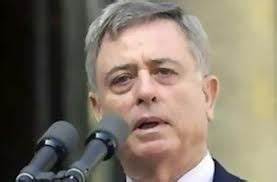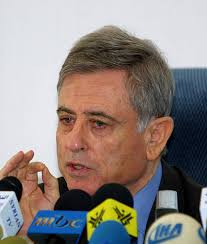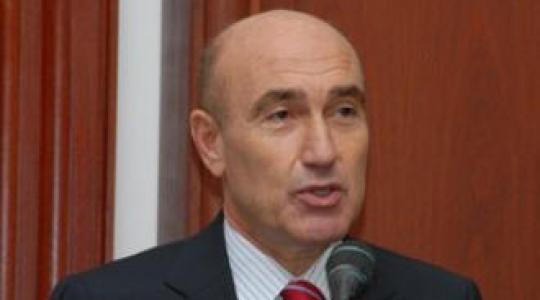Syrian Vice President Abdulhaleem Khaddam met with the faculty members of Damascus University on the university’s auditorium on the evening of Sunday, February 18, 2001, to discuss the topics and issues at hand.
The newspaper “Al-Hayat” published the verbatim text of Mr. Khaddam’s position and his opinion on civil society, freedom, democracy, and internal affairs, along with some of the discussions that were raised after his lecture.
Comrades,
Naturally, the leadership discussed the political situation in the country in light of the conference decisions and the speech of Comrade President of the Republic, where he spoke in this speech about the prospects of developing the political evolution in the country. The leadership took some steps, including granting permission to the parties of the “Progressive National Front” to open offices and issue newspapers while aiming to create a general atmosphere that reassures people and encourages them to consider how they can contribute to supporting the state and party’s policies in this stage that requires comprehensive national support.
Unfortunately, we expected that many of those who wrote or write would take the initiative of President Bashar al-Assad and contribute to figuring out how to turn it into a practical reality in the country’s political life. This would create an atmosphere for dialogue in the country, from individual to individual, from organization to organization. But this did not happen. What happened? Statements are issued in the name of Syria’s intellectuals.
First, let’s agree on what culture means and what an intellectual means: Dr. Constantin Zureiq, one of the pioneers of thought in the Arab world in his book “National Consciousness,” defined culture, saying: Culture consists of two elements: the first, true knowledge through effort with internal reasoning, balanced awareness of the fundamental ideas of sciences, arts, and literature, and specialized knowledge in one of them.
The second, the mental and spiritual efforts in which knowledge is acquired and becomes a part of a person’s life. So, a fundamental condition for culture and the intellectual is that there should be intellectual effort, meaning the use of scientific analysis methodology in research and exploration. Was this done? Is this what was mentioned? Is it true that the era is the most important era in Syria’s history, characterized only by injustice, freedom confiscation, corruption, persecution, and murder? Is this statement true? Did those who analyzed reality study the facts, the evolution of life in Syria? Millions of our sons and daughters in schools and universities have all the opportunities for education. Did this come from a void? Did this infrastructure—hospitals, clinics, water, electricity, and roads—come from a void? Then Syria is the only Arab country under the leadership of the late President Hafez al-Assad that remained steadfast, while other essential countries faltered. Did President Hafez al-Assad stand still in these positions?
Are there mistakes? Yes, there are mistakes, there is a flaw, there is corruption. If we are truly objective and if we use the scientific analytical approach, we must say: this experience succeeded in this and that, and it failed in this and that. But did that happen? Then there was talk about three issues: freedom, democracy, and civil society. Unfortunately, the main issue that occupies the mind of every child in Syria, every elder, every woman, and every man is the Arab-Israeli conflict. It is discussed as if Syria is a regionally and internationally comfortable country. As if all the issues are available, but the problem remains whether to issue a statement or not.
Democracy is not an off-the-shelf outfit that we buy from the market or import from one country or another. In Europe, they reached the current stage of democracy through a struggle and development since the French Revolution and the Cromwellian Revolution in Britain. When did Europeans reach some level of true democracy? When they understood the economic needs of the citizens. In Europe, a citizen may not find a job, but there is unemployment benefits. In Syria, in the early 1970s, we formed a People’s Council, which was the result of selection. I believe it was relatively better than all the councils that came later. Of course, it was a certain council with no connection to democracy at all, as a fundamental condition of democracy is that elected institutions should be chosen by the people.
After parliamentary sessions, the leadership in 1990 adopted a direction to leave one-third of the seats open. Let’s see how the elections were conducted and who came, and what role money played in these elections. Wasn’t it money? You all followed the elections: in Damascus, Aleppo, Homs, and everywhere. In Damascus, candidates spent hundreds of millions of Syrian pounds to buy votes. Can we say that the buying process achieves democracy? So, our understanding of democracy should be an understanding of the economic, cultural, and social development stage first. When someone is unemployed and hungry, and a candidate says to him, “Take a thousand liras, three thousand liras, forty U.S. dollars,” this money didn’t elect; it is the one who was elected.
Freedom is a fundamental pillar of the Ba’ath Party, and it is one of its goals. Ba’athists have been advocating for freedom of expression and elections since the party’s foundation. Returning to the topic of elections, some speak of the exemplary state of democratic elections in Syria during the 1950s. Most of you may not know much about that period. In the 1950s, it was also said that democracy was exemplary in Syria during that time. However, by any measure, there was no democracy in the 1950s. In the 1954 elections, there were 17 deputies from the Ba’ath Party, while the majority of the council was made up of deputies from the National Party, the People’s Party, the Independent Bloc, and the Tribes, all of which were linked to Iraq and wanted to unite with Iraq. Nevertheless, which political line did Syria follow? It was the Ba’ath Party’s line. The minority in the democratic institution of the People’s Council led the country’s policy, where there was a conflict between the aspirations and emotions of the people and the parliamentary forces that came to power, whether through wealth, feudalism, tribalism, or sectarianism.
Comrades,
Regarding freedom, the Ba’ath Party cannot abandon the issue of freedom because doing so would mean forsaking a fundamental principle of its principles. It cannot fear freedom because that would imply incapacity, and it is neither incapable nor willing to relinquish its positions and principles. However, is freedom an absolute issue? Naturally, freedom is a part of human nature, and any suppression of freedom contradicts human nature. The repression of freedom is a permanent killing of creativity, thought, progress, and everything that exists.
However, is freedom an absolute issue? Absolutely not. There is no absolute freedom in history or in the world. When freedom becomes an absolute issue, it allows me the opportunity to kill Zaid, and it allows Zaid the opportunity to kill Omar or assault him. Therefore, the constitution came, defining freedoms and stipulating that laws regulating the exercise of these freedoms should be enacted, granting individuals complete freedom of expression, thought, participation, and practice, as long as it does not conflict with the rights of another individual to exercise these rights and does not conflict with national unity, security, and stability.
Is it freedom to stand and say or launch slogans and ideas that lead to the dismantling of national unity in the country? Is this freedom? When some said that Syria is a beautiful mosaic of religions, races, immigrants, and that each category should have its own culture and civilization, and cooperation between them should be balanced. What does that mean? France failed in this matter. Where are the members of this group heading? Is it reasonable to divide Syria into sects and races, with each group having its freedoms, civilization, and culture? What remains of Syria?
The most dangerous thing produced by the new international situation is the dismantling of national units through the slogan of self-determination. They want self-determination for minorities in Yugoslavia but reject self-determination for the Palestinian people, and this is a result of double standards in the use of political rules or ideas.
Civil society and the Algerian experience
The topic of civil society has been raised, and certain arguments have been based on it. Are there conflicts in Syria, with people fighting each other? Or do people want to fight each other? Are we a civil society? Okay, as intellectuals, if you reject this society, what is the alternative society? Is the Algerian society an alternative? Is what happened in Algeria? Is what happened in Yugoslavia? Is what happened in Somalia?
In this context, I want to refer to the Algerian experience: Former President Chadli Bendjedid decided to embark on a democratization process. That’s his right. He delivered a speech accusing the “National Liberation Front” and the entire state of corruption and destruction and held elections. It is natural for the opposition to succeed as long as the head of state accuses all institutions of society of destruction and corruption. The “Islamic Salvation Front” came. What happened? The military staged a coup. What happened? Algeria was torn apart. So before we raise this slogan, we must study what civil society means.
In any case, the esteemed Dr. Antoine Messarra explained this situation in one of his press interviews very clearly. He said: Civil society requires democratic institutions and the presence of national institutions, i.e., unions and organizations.
There may be some flaw in this institution or that one, and we discuss the flaw, but we do not undermine what exists because no one has an alternative, and no one has the ability to undermine what exists. This must be clear because we will not allow Syria to turn into Algeria or Yugoslavia or any other. This matter must be clear, and the responsibility of intellectuals is to help strengthen national unity and develop the national society in the country. Criticizing what exists is fine, but not by criminalizing what exists, and considering what exists as misguidance is also not appropriate.
Yes, there are mistakes. The late President Hafez al-Assad addressed the parliament twice, and in 1999, he spoke about the existing flaws in the state. No one can defend the flaws, and no one can say that these flaws are harmless. However, we discuss the flaws and how to overcome and address them.
Don’t we have unions? Yes, we have unions. Is the Ba’ath Party in control of the unions? Yes, the party controls the unions. Why? Because Ba’athists are the majority in these unions. Is it required during union elections that Ba’athists vote for their opponents or others? Is it required for the Ba’ath Party leadership to dismiss one and a half million of its two million members to have a civil society?
A few years ago, the U.S. Ambassador in Damascus, Ryan Crocker, requested a meeting with the head of the labor union, Azz Al-Din Nasser, and presented him with a memorandum demanding trade union pluralism. This means that the labor union becomes ten unions, meaning the fragmentation of the labor movement. Is this in favor of civil society and its requirements? Unfortunately, they – sorry to talk about people with whom I have some friendships and respect – and it is painful that discussions take place without assessing and analyzing the situation.
Let’s look at Syria over thirty years. Why did it face challenges? What happened in Syria over the past thirty years? The October 1973 war, didn’t it have repercussions on the national economy? The Lebanese civil war, didn’t it have repercussions on the internal situation in Syria? Our dispute with the late Egyptian President Anwar Sadat, didn’t it have repercussions? The siege of Syria and the bloody events carried out by the Muslim Brotherhood over four years, didn’t they have repercussions on our political, economic, and social life? The Iraq-Iran war, the invasion of Lebanon in 1982, the second war in Lebanon, didn’t they have their repercussions? The illness of President Hafez al-Assad, the problem of Rifaat al-Assad, and the invasion of Iraq into Kuwait – all these are major events that the country went through. Do such events pass without leaving their marks? If someone wants to contribute to political life, they should use scientific analysis and research to reach different conclusions.
During the open floor for questions and interventions, several Ba’athist professors who participated in cultural forums discussions spoke. Dr. Salim Barkat pointed out that the forum discussions targeted the head of the regime and governance, but they benefited the party and “revitalized it, freeing it from sluggishness.” He emphasized that there are many tasks awaiting the party, and the battle has begun to eliminate all distortions within the party. He stressed the need to put all sacred values on the table for dialogue and to evaluate themselves before others evaluate them. Dr. Barkat questioned the centralization imposed by the top leadership on lower-level leaders, criticizing it as having no value in the party’s literature and being filled with flaws. He stated that the mistake lies not with the comrades but with their leadership, and if the party’s conditions are not rectified, the state’s conditions will not improve.
Dr. Mohamed Kamil Imran advised not to fear the phenomenon of civil society, formed by bankrupt intellectuals who have aged mentally and temporally. He warned that if the youth join this phenomenon, it would be a catastrophe, urging the leadership to take significant steps to address this issue. Dr. Muneer Al-Ahmad stressed the necessity of expecting conspiracy at every moment, claiming that intellectuals and advocates of civil society are sowing the seeds of discord.
On the other hand, Dr. Emad Fawzi Shaibi, a non-Ba’athist, clarified that President Hafez al-Assad, at the beginning of his rule, considered civil society as an intermediary between the state and society. He suggested that activating administration should provide real and tangible services to the people promptly. Dr. Ahmed Barqawi questioned whether the criticism against these forums and the civil society phenomenon was just an analysis or a decision to cancel and stop them. He highlighted the diversity of opinions within society, stating that it helps understand the country’s experience and history.
Dr. Adnan Ali added, “Why fear the idea of civil society? If these forces aim to preserve the country’s constitution and laws and want to play a role in shaping executive decisions, then they are welcome.” He emphasized that no one should stand against them since they are sons of the nation and should have a role in serving their country, but in a mutually agreed-upon manner, not one imposed on them or one they want to impose on others.
On his part, the Syrian Vice President addressed most of the questions and interventions, elaborating on the essence of what he mentioned in the lecture. He added, “It is necessary to recognize a number of facts, especially the circumstances that Syria went through during the 30 years of significant events. There were major events that had repercussions, leading to the growth of many negatives that we all complain about. There are positive accumulations and negative accumulations, and the party’s task is to take these positives and avoid the negatives. When we talk about all these circumstances, can we eliminate customary judgments while we are in a state of war? The state of emergency law was applied through which mistakes were made, and it was applied in conditions where it was a mistake. It is true, and we should talk about the mistake and work to overcome it. But why focus now on the state of emergency law to let the country escape?”
Regarding his opinion on the participation of Ba’athists in the forums, Khaddam said, “I have reviewed the dialogue, and in my opinion, they were not successful. The weakness of these activists and intellectuals is not that Riyadh Seif is an agent for Adidas, but the weakness lies with them. When the Ba’athists went, they went to defend, not to attack. When a decision was issued by the leadership for some party members capable of responding, the goal was to refute what was proposed, highlighting its shortcomings and backgrounds.”
He continued that the Ba’ath Party leadership gave activists and intellectuals a “six-month period,” but there are limits, and the most important of these limits is the security and stability of the country. The party’s leadership is seriously concerned with developing political life in the country, but this matter does not come in the immediate priority, which is addressing the economic situation and providing people’s needs and job opportunities.



